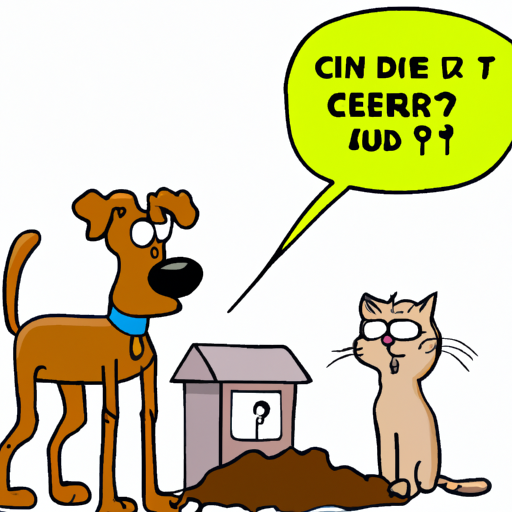As a caregiver, you may have asked yourself this question more times than you’d like to admit. You watch your dog, your loyal companion, do something that seems utterly baffling and, frankly, quite disgusting. Why on earth would they choose to snack on the contents of the cat’s litter box?
Understanding the Canine Palette
First, let’s dive into the peculiar taste preferences of dogs. As strange as it may seem to us, dogs are not repulsed by the same things humans are. They roll in dead things, sniff each other’s behinds and, yes, sometimes they eat cat poop. It’s important to remember that dogs have a much stronger sense of smell than humans, and what may be repugnant to us could be enticing to them.
- Cat food is generally higher in protein and fat than dog food, making it very appealing.
- The digestive system of a cat is different from that of a dog. There might be undigested food particles remaining that are attractive to dogs.
Health Risks Associated with Coprophagia
Now, let’s talk about the potential health risks associated with this habit. Eating any feces can expose your dog to parasites, bacteria, and disease. Cat feces is no exception.
| Risk | Description |
|---|---|
| Parasites | Some parasites can be passed from cats to dogs through feces. |
| Bacteria | Bacteria like salmonella can live in feces and be passed to dogs. |
| Disease | Diseases like toxoplasmosis can also be transmitted from cat feces to dogs. |
Behavioral Implications and Correction
It’s not just about health risks, though. This behavior can have implications for your dog’s behavior and training. It can be a sign of stress, boredom, or just a lack of proper training.
- Stress: Dogs often resort to unusual behavior when they’re stressed. Changes in the household, like a new pet or a move, can cause stress.
- Boredom: Dogs need mental and physical stimulation. If they’re bored, they might start exploring the litter box.
- Training: It’s important to teach your dog appropriate behavior. If they’ve learned they can get away with eating from the litter box, they’ll keep doing it.
Preventing Your Dog from Eating Cat Poop
Once you’ve identified the reason behind your dog’s behavior, you can start taking steps to correct it. This can involve changing the location of the litter box, providing more stimulation for your dog, or consulting with a professional dog trainer.
- Change the location: Put the litter box somewhere your dog can’t access.
- Provide more stimulation: Make sure your dog has plenty of toys and gets enough exercise.
- Consult a professional: If the behavior continues, it might be time to seek professional help.
FAQ
Q: Can eating cat poop make my dog sick?
A: Yes, it can expose your dog to parasites, bacteria, and diseases.
Q: How can I stop my dog from eating cat poop?
A: You can change the location of the litter box, provide more stimulation for your dog, or consult a professional dog trainer.
Q: Is it normal for dogs to eat cat poop?
A: While it’s not uncommon, it’s a behavior that should be discouraged due to the potential health risks.
Q: Can this behavior indicate a nutritional deficiency?
A: It’s possible, but more often it’s due to the appealing smell and taste of cat poop. If you’re concerned, consult with your vet.
Remember, as a caregiver, your goal is to provide a safe, healthy environment for your pet. Understanding and addressing this peculiar habit is part of that responsibility.



